助动词与情态动词-讲解及练习测试题
- 格式:doc
- 大小:41.50 KB
- 文档页数:6
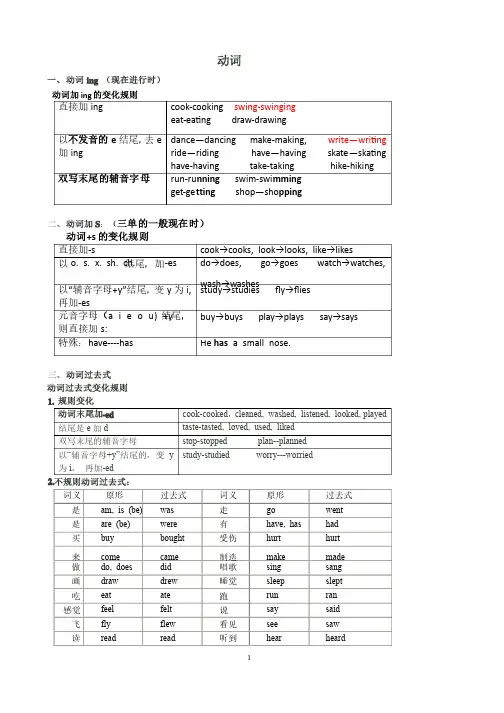
动词加ing 的变化规则直接加ing cook-cooking swing-swinging eat-ea ng draw-drawing 以不发音的e 结尾,去e 加ing dance dance——dancing make-making, write —wri ng ride ride——riding have have——having skate skate——ska ng have-having take-taking hike-hiking 双写末尾的辅音字母run-ru nning swim-swi mming get-ge tting shop shop——sho pping动词+s 的变化规则 直接加-s cook→cooks, look→looks, like→likes以o. s. x. sh. ch.结尾,加-es do→does, go go→→goes watch→watches, wash→washes 以“辅音字母+y”结尾,变y 为i, 再加-es study→studies fly→flies 元音字母(a i e o u) +y 结尾,则直接加s: buy→buys play→plays say→says 特殊:have----has He has a small nose. 动词末尾加-ed cook-cooked ,cleaned, washed, listened, looked, played 结尾是e 加d taste-tasted, loved, used, liked 双写末尾的辅音字母 stop-stopped plan--planned 以“辅音字母+y”结尾的,变y 为i , 再加-ed study-studied worry---worried 词义词义 原形原形 过去式过去式 词义词义 原形原形 过去式过去式 是 am, is (be) was 走 go went 是 are (be) were 有 have, has had 买 buy bought 受伤受伤 hurt hurt 来 come came 制造制造 make made 做 do, does did 唱歌唱歌 sing sang 画 draw drew 睡觉睡觉 sleep slept 吃 eat ate 跑 run ran 感觉感觉 feel felt 说 say said 飞 fly flew 看见看见 see saw 读read read 听到听到hear heard 四、be 动词和行为动词的用法区别1.Be动词包括:is, am, are, was, were 2.实义动词:某个实际做出来的动作词语,如:swim, wash, do, go, buy, fly, sleep等等。
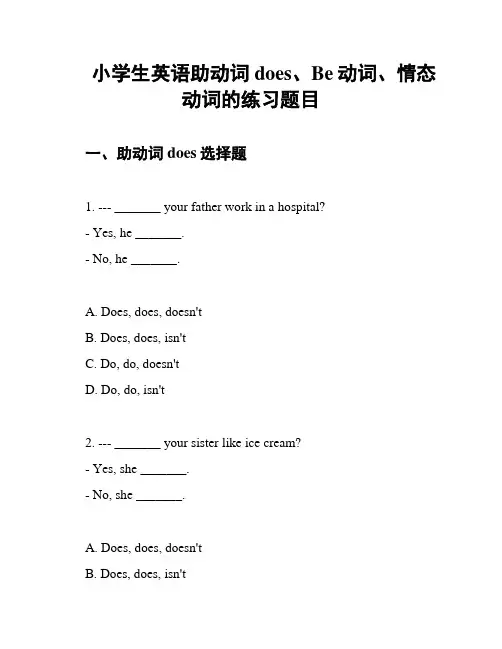
小学生英语助动词does、Be动词、情态动词的练习题目一、助动词does选择题1. --- _______ your father work in a hospital?- Yes, he _______.- No, he _______.A. Does, does, doesn'tB. Does, does, isn'tC. Do, do, doesn'tD. Do, do, isn't2. --- _______ your sister like ice cream?- Yes, she _______.- No, she _______.A. Does, does, doesn'tB. Does, does, isn'tC. Do, do, doesn'tD. Do, do, isn't3. --- _______ they watch TV every evening? - Yes, they _______.- No, they _______.A. Do, do, doesn'tB. Do, do, aren'tC. Does, does, doesn'tD. Does, does, isn't4. --- _______ you play football after school? - Yes, I _______.- No, I _______.A. Do, do, doesn'tB. Do, do, aren'tC. Does, does, doesn'tD. Does, does, isn't5. --- _______ Wendy have a pet dog?- Yes, she _______.- No, she _______.A. Does, does, doesn'tB. Does, does, isn'tC. Do, do, doesn'tD. Do, do, isn't二、Be动词填空题1. Tony _______ a student. He _______ in Grade 4.2. We _______ brothers. _______ names are John and Mike.3. She _______ a doctor. She _______ at a hospital.4. I _______ a teacher. I _______ English.5. They _______ my friends. _______ names are Tom and Sarah.三、情态动词选择题1. You _______ pack your bag before you go to school.A. mustB. canC. shouldD. would2. He _______ swim very well when he was young.A. canB. mayC. willD. could3. _______ I have a piece of cake?A. MayB. CanC. CouldD. Should4. You _______ eat vegetables for a healthy diet.A. mustB. canC. willD. have to5. She _______ play the piano when she was five years old.A. mustB. canC. couldD. should。
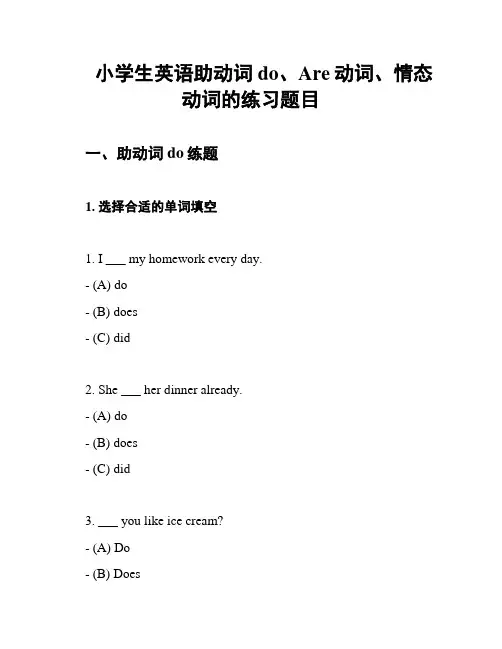
小学生英语助动词do、Are动词、情态动词的练习题目一、助动词do练题1. 选择合适的单词填空1. I ___ my homework every day.- (A) do- (B) does- (C) did2. She ___ her dinner already.- (A) do- (B) does- (C) did3. ___ you like ice cream?- (A) Do- (B) Does- (C) Did2. 句子改写将下列句子改写为否定句和疑问句。
1. He eats breakfast every morning.- 否定句: He ___ ___ breakfast every morning.- 疑问句: ___ he eat breakfast every morning?2. She helps her friends with their homework.- 否定句: She ___ ___ her friends with their homework. - 疑问句: ___ she help her friends with their homework?二、Are动词练题1. 选择合适的单词填空1. They ___ playing soccer in the park.- (A) is- (B) am- (C) are2. ___ your parents at home?- (A) Is- (B) Am- (C) Are3. We ___ going to the movies tonight. - (A) is- (B) am- (C) are2. 根据所给单词填空完成句子1. I ___ a student.2. She ___ a doctor.3. They ___ brothers and sisters.三、情态动词练题1. 选择合适的情态动词填空1. I ___ play the guitar.- (A) can- (B) do- (C) am2. You ___ help your mother with the housework. - (A) can- (B) do- (C) am3. He ___ swim very well.- (A) can- (B) does- (C) is2. 句子改写将下列句子用合适的情态动词或助动词完成。
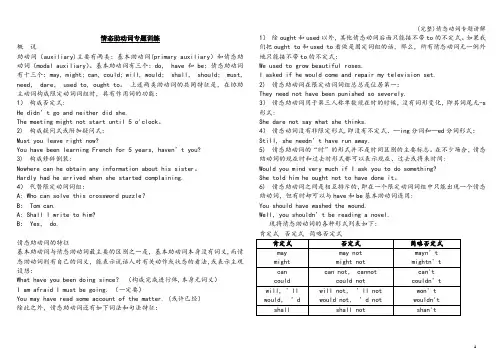
(完整)情态动词专题讲解情态助动词专题训练概说助动词(auxiliary)主要有两类:基本助动词(primary auxiliary)和情态助动词(modal auxiliary)。
基本助动词有三个:do, have和be;情态助动词有十三个:may, might; can, could; will, would; shall, should; must, need, dare, used to, ought to。
上述两类助动词的共同特征是,在协助主动词构成限定动词词组时,具有作用词的功能:1)构成否定式:He didn’t go and neither did she.The meeting might not start until 5 o'clock。
2) 构成疑问式或附加疑问式:Must you leave right now?You have been learning French for 5 years, haven’t you?3) 构成修辞倒装:Nowhere can he obtain any information about his sister。
Hardly had he arrived when she started complaining.4)代替限定动词词组:A: Who can solve this crossword puzzle?B: Tom can.A: Shall I write to him?B: Yes, do.情态助动词的特征基本助动词与情态助动词最主要的区别之一是,基本助动词本身没有词义,而情态助动词则有自己的词义,能表示说话人对有关动作或状态的看法,或表示主观设想:What have you been doing since?(构成完成进行体,本身无词义)I am afraid I must be going. (一定要)You may have read some account of the matter. (或许已经)除此之外,情态助动词还有如下词法和句法特征:1)除ought和used以外,其他情态动词后面只能接不带to的不定式。
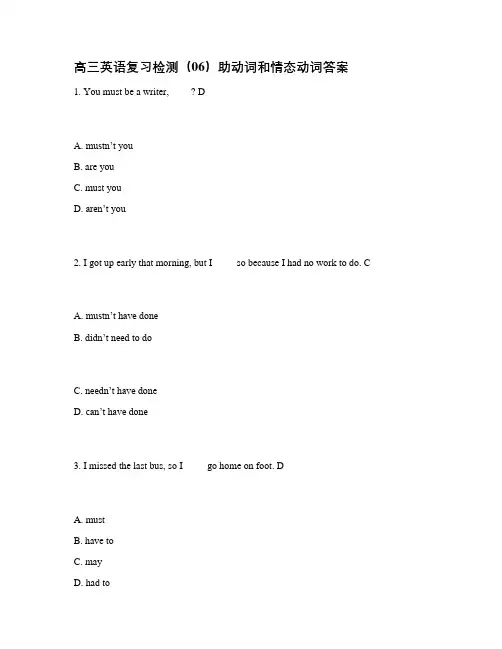
高三英语复习检测(06)助动词和情态动词答案1. You must be a writer, ____? DA. mustn’t youB. are youC. must youD. aren’t you2. I got up early that morning, but I ____ so because I had no work to do. CA. mustn’t have doneB. didn’t need to doC. needn’t have don eD. can’t have done3. I missed the last bus, so I ____ go home on foot. DA. mustB. have toC. mayD. had to4. -- Please don’t make a noise.` B-- ____. I’ll be as quiet as a mouse.A. Yes, I won’tB. No, I won’tC. No, I willD. Yes, I will5. One ought ____ for what one hasn’t done. AA. not to be punishedB. to not be punishedC. to not punishedD. not be punished6. Let’s clean our classroom, ____? CA. will youB. don’t weC. shall weD. do you7. Let us play basketball, ____? AA. will youB. don’t weC. shall weD. do you8. -- There were already five people in the car but they managed to take me as well. -- It ____ a comfortable journey. DA. can’t beB. shouldn’t beC. mustn’t have beenD. couldn’t have been9. -- May I stop here?-- No, you ____. ` AA. mustn’tB. might notC. needn’tD. won’t10. The plant is dead. I ____ it more water. DA. will giveB. would have givenC. must giveD. should have given11. You ____ return the book now. You can keep it till next week if you like. CA. can’tB. mustn’tC. needn’tD. may not12. The little girl ____ there alone. CA. not dare goB. dares not goC. dare not goD. dare not to go13. Without his help, we ____ such rapid progress. BA. do n’t makeB. would not makeC. didn’t makeD. would not have made14. A computer ____ think for itself; it must be told what to do. (NMET 1991 AA. can’tB. couldn’tC. may notD. might not15. -- Could I borrow your dictionary? (NMET 1992--Yes, of course you ____. CA. mightB. willC. canD. should16. -- Shall we go skating or stay at home?-- Which ____ do yourself? (NMET 1992 BA. do you ratherB. would you ratherC. will you ratherD. should you rather17. Tom ought not to ____ me your secret, but he meant no harm. (NMET 1993 AA. have toldB. tellC. by tellingD. having told18. Peter ____ come with us tonight, but he isn’t very sure yet. (NMET 1993 BA. mustB. mayC. canD. will19. -- Shall I tell John about it? (NMET 1994-- No, you ____. I’ve told him already. AA. needn’tB. wouldn’tC. mustn’tD. shouldn’t20. -- Don’t forget to come to my birthday party tomorrow. (NMET 1994-- ____. BA. I don’tB. I won’tC. I can’tD. I haven’t21. --There were already five people in the car but they managed to take me as well. -- It ____ a comfortable journey. (NEMT 1995 DA. can’t beB. shouldn’t beC. mustn’t have beenD. couldn’t have been22. It’s already seven o’clock. Jack ____ be here at any moment. (NEMT 1995 CA. mustB. needC. shouldD. can23. Johnny, you ____ play with the knife, you ____ hurt yourself. (NMET 1996 BA. won’t; can’tB. mustn’t; mayC. shouldn’t; mustD. can’t; shouldn’t24. The fire spread through the hotel very quickly but everyone ____ get out. (NEMT 1997 DA. had toB. wouldC. couldD. was able to25. -- When can I come for the photos? I need them tomorrow afternoon. (NMET 1998 --They ____ be ready by 12:00. BA. canB. shouldC. mightD. need26. -- I stayed at a hotel while in New York. (NMET 1998-- Oh, did you? You ____ with Barbara. AA. could have stayedB. could stayC. would stayD. must have stayed27. -- Will you stay for lunch? (NEMT 1999-- Sorry, ____. My brother is coming to see me. BA. I mustn’tB. I can’tC. I needn’tD. I won’t28. -- Are you coming to Jeff’s party? (NEMT 2000-- I’m not sure. I ____ go to the concert instead. DA. mustB. wouldC. shouldD. might29. -- Is John coming by train? (NEMT 2002-- He should, but he ____ not. He likes driving his car. DA. mustB. canC. needD. may30. -- I heard they went skiing in the mountains last winter. (北京 2002-- It ____ true because there was little snow there. CA. may not beB. won’t beC. couldn’t beD. mustn’t be31. A left-luggage office is a place where bags ____ be left for a short time, especially ata railway station. (NEMT 2003 BA. shouldB. canC. mustD. will32. I often see lights in the empty house. Do you think I _____ report it to police? (04广西 AA. shouldB. mayC. willD. can33. How ____ you say that you really understand the whole story if you have covered only part of the article? (上海 2003 AA. canB. mustC. needD. may34. You ____ be tired –you’ve only been working for an hour. (04吉林 CA. must notB. won’tC. can’tD. may not35. I’ve lost one of my gloves. I ____ it somewhere. (05北京 BA. must dropB. must have droppedC. must be droppingD. must have been dropped。
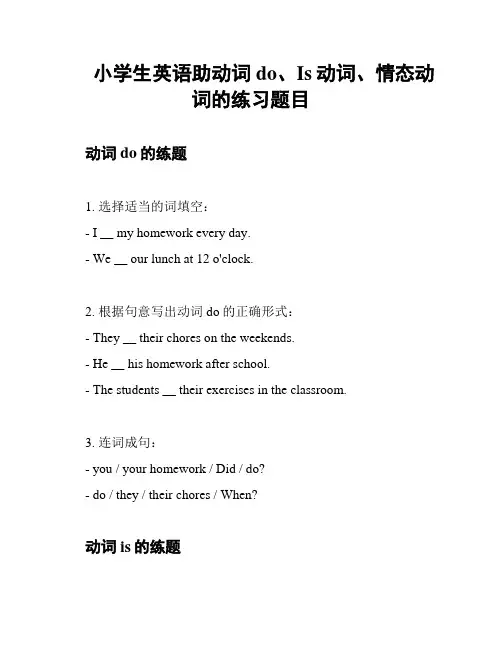
小学生英语助动词do、Is动词、情态动词的练习题目动词do的练题1. 选择适当的词填空:- I __ my homework every day.- We __ our lunch at 12 o'clock.2. 根据句意写出动词do的正确形式:- They __ their chores on the weekends.- He __ his homework after school.- The students __ their exercises in the classroom.3. 连词成句:- you / your homework / Did / do?- do / they / their chores / When?动词is的练题1. 填入is或is not:- She __ happy.- They __ at home.- It __ a cat.2. 根据句意填入动词is的正确形式:- The dog __ in the garden.- The flowers __ beautiful.- This book __ mine.3. 连词成句:- is / it / What?- happy / you / Are?情态动词的练题1. 选择适当的情态动词填空:- I __ go to the park with you.- You __ eat too much candy.- He __ play the piano very well.2. 根据句意填入合适的情态动词:- __ I use your pencil?- She __ speak French fluently.3. 连词成句:- can / Can / swim / you?- must / We / study / hard.以上是关于小学生英语助动词do、Is动词、情态动词的练题目。
请根据题目要求填写正确答案,并通过练提高语言能力和理解能力。
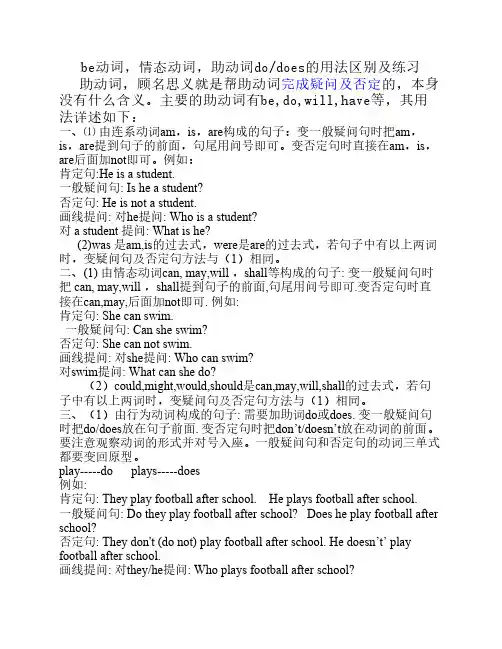
be动词,情态动词,助动词do/does的用法区别及练习助动词,顾名思义就是帮助动词完成疑问及否定的,本身没有什么含义。
主要的助动词有be,do,will,have等,其用法详述如下:一、⑴由连系动词am,is,are构成的句子:变一般疑问句时把am,is,are提到句子的前面,句尾用问号即可。
变否定句时直接在am,is,are后面加not即可。
例如:肯定句:He is a student.一般疑问句: Is he a student?否定句: He is not a student.画线提问: 对he提问: Who is a student?对 a student 提问: What is he?(2)was 是am,is的过去式,were是are的过去式,若句子中有以上两词时,变疑问句及否定句方法与(1)相同。
二、(1) 由情态动词can, may,will ,shall等构成的句子: 变一般疑问句时把 can, may,will ,shall提到句子的前面,句尾用问号即可.变否定句时直接在can,may,后面加not即可. 例如:肯定句: She can swim.一般疑问句: Can she swim?否定句: She can not swim.画线提问: 对she提问: Who can swim?对swim提问: What can she do?(2)could,might,would,should是can,may,will,shall的过去式,若句子中有以上两词时,变疑问句及否定句方法与(1)相同。
三、(1)由行为动词构成的句子: 需要加助词do或does. 变一般疑问句时把do/does放在句子前面. 变否定句时把don’t/doesn’t放在动词的前面。
要注意观察动词的形式并对号入座。
一般疑问句和否定句的动词三单式都要变回原型。
play-----do plays-----does例如:肯定句: They play football after school. He plays football after school.一般疑问句: Do they play football after school? Does he play football after school?否定句: They don't (do not) play football after school. He doesn’t’ play football after school.画线提问: 对they/he提问: Who plays football after school?对play football提问: What do they do after school? What does he do after school?对after school提问: When do they play football? When does he play football?(2)did是do和did的过去式,变一般疑问句时把did放在句子前面.变否定句时把didn’t放在动词的前面, 要注意观察动词的形式并对号入座。
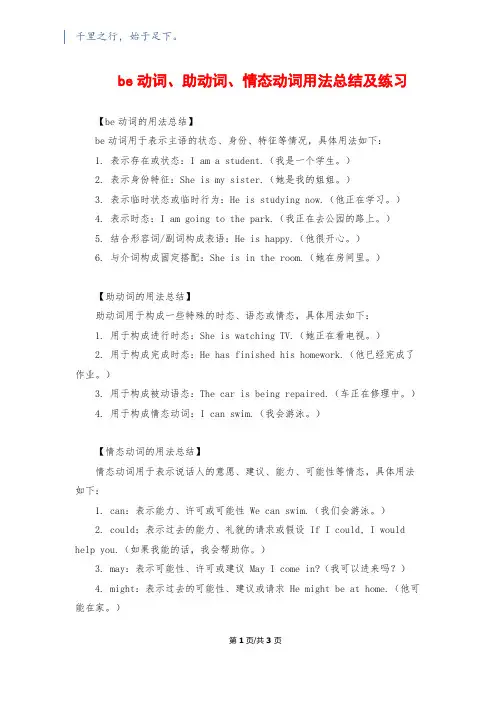
千里之行,始于足下。
be动词、助动词、情态动词用法总结及练习【be动词的用法总结】be动词用于表示主语的状态、身份、特征等情况,具体用法如下:1. 表示存在或状态:I am a student.(我是一个学生。
)2. 表示身份特征:She is my sister.(她是我的姐姐。
)3. 表示临时状态或临时行为:He is studying now.(他正在学习。
)4. 表示时态:I am going to the park.(我正在去公园的路上。
)5. 结合形容词/副词构成表语:He is happy.(他很开心。
)6. 与介词构成固定搭配:She is in the room.(她在房间里。
)【助动词的用法总结】助动词用于构成一些特殊的时态、语态或情态,具体用法如下:1. 用于构成进行时态:She is watching TV.(她正在看电视。
)2. 用于构成完成时态:He has finished his homework.(他已经完成了作业。
)3. 用于构成被动语态:The car is being repaired.(车正在修理中。
)4. 用于构成情态动词:I can swim.(我会游泳。
)【情态动词的用法总结】情态动词用于表示说话人的意愿、建议、能力、可能性等情态,具体用法如下:1. can:表示能力、许可或可能性 We can swim.(我们会游泳。
)2. could:表示过去的能力、礼貌的请求或假设 If I could, I would help you.(如果我能的话,我会帮助你。
)3. may:表示可能性、许可或建议 May I come in?(我可以进来吗?)4. might:表示过去的可能性、建议或请求 He might be at home.(他可能在家。
)第1页/共3页锲而不舍,金石可镂。
5. must:表示必须、推测、肯定或建议 You must finish your homework.(你必须完成作业。
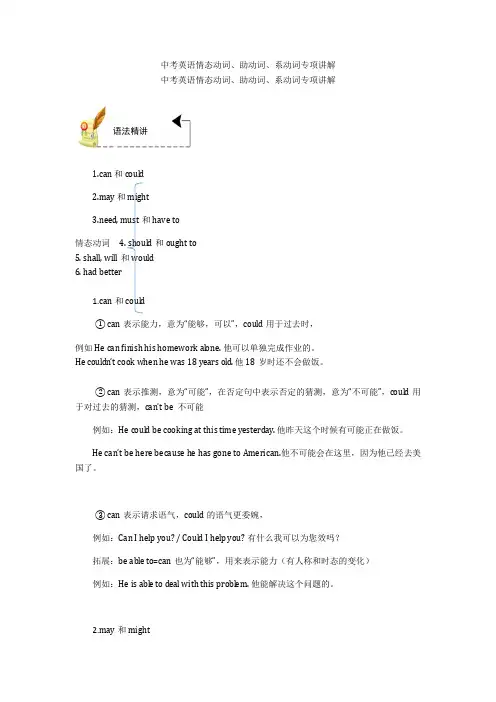
中考英语情态动词、助动词、系动词专项讲解中考英语情态动词、助动词、系动词专项讲解语法精讲1.can 和could2.may 和might3.need, must和have to情态动词 4. should和ought to5. shall, will和would6. had better1.can和coul d① can表示能力,意为“能够,可以”,could用于过去时,例如He can finish his homework al one. 他可以单独完成作业的。
He couldn’t cook when he was 18 years old. 他18岁时还不会做饭。
② can表示推测,意为“可能”,在否定句中表示否定的猜测,意为“不可能”,could用于对过去的猜测,can’t be 不可能例如:He could be cooking at this time yesterday. 他昨天这个时候有可能正在做饭。
He can’t be here be cause he has gone to American.他不可能会在这里,因为他已经去美国了。
③ can表示请求语气,coul d的语气更委婉,例如:Can I help you? / Coul d I help you? 有什么我可以为您效吗?拓展:be abl e to=can也为“能够”,用来表示能力(有人称和时态的变化)例如:He is able to d eal with this problem. 他能解决这个问题的。
2.may和 might① may表示请求,might语气更委婉,例如:May I help you?Might I sit here?② may表示肯定的推测,语气比can更弱,might对过去的推测例如:Mary may be doing her homework now.May can be doing her homework now. can表达的推测语气比may更强,更有把握。
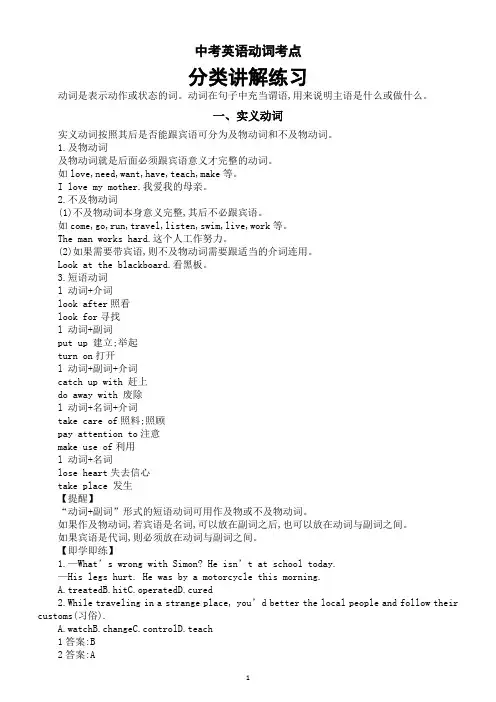
中考英语动词考点分类讲解练习动词是表示动作或状态的词。
动词在句子中充当谓语,用来说明主语是什么或做什么。
一、实义动词实义动词按照其后是否能跟宾语可分为及物动词和不及物动词。
1.及物动词及物动词就是后面必须跟宾语意义才完整的动词。
如love,need,want,have,teach,make等。
I love my mother.我爱我的母亲。
2.不及物动词(1)不及物动词本身意义完整,其后不必跟宾语。
如come,go,run,travel,listen,swim,live,work等。
The man works hard.这个人工作努力。
(2)如果需要带宾语,则不及物动词需要跟适当的介词连用。
Look at the blackboard.看黑板。
3.短语动词l 动词+介词look after照看look for寻找l 动词+副词put up 建立;举起turn on打开l 动词+副词+介词catch up with 赶上do away with 废除l 动词+名词+介词take care of照料;照顾pay attention to注意make use of利用l 动词+名词lose heart失去信心take place 发生【提醒】“动词+副词”形式的短语动词可用作及物或不及物动词。
如果作及物动词,若宾语是名词,可以放在副词之后,也可以放在动词与副词之间。
如果宾语是代词,则必须放在动词与副词之间。
【即学即练】1.—What’s wrong with Simon? He isn’t at school today.—His legs hurt. He was by a motorcycle this morning.A.treatedB.hitC.operatedD.cured2.While traveling in a strange place, you’d better the local people and follow their customs(习俗).A.watchB.changeC.controlD.teach1答案:B2答案:A二、系动词系动词不能单独作谓语,必须与表语一起构成谓语。
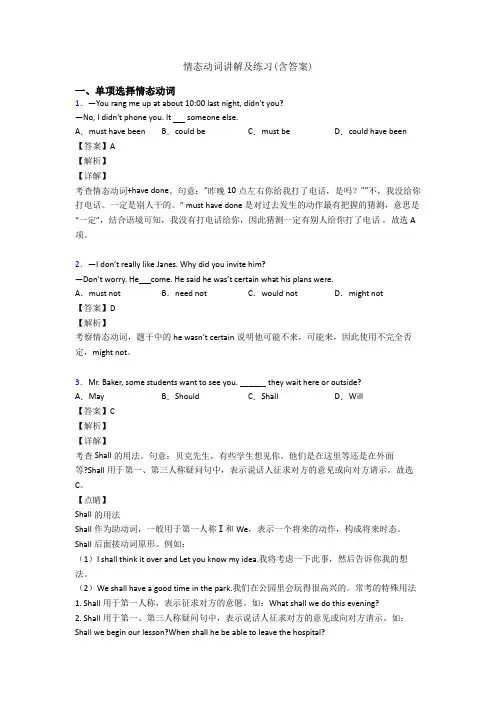
情态动词讲解及练习(含答案)一、单项选择情态动词1.—You rang me up at about 10:00 last night, didn't you?—No, I didn't phone you. It someone else.A.must have been B.could be C.must be D.could have been 【答案】A【解析】【详解】考查情态动词+have done。
句意:“昨晚10点左右你给我打了电话,是吗?”“不,我没给你打电话。
一定是别人干的。
” must have done 是对过去发生的动作最有把握的猜测,意思是“一定”,结合语境可知,我没有打电话给你,因此猜测一定有别人给你打了电话。
故选A 项。
2.—I don’t really like Janes. Why did you invite him?—Don’t worry. He come. He said he was’t certain what his plans were.A.must not B.need not C.would not D.might not【答案】D【解析】考察情态动词,题干中的he wasn’t certain说明他可能不来,可能来,因此使用不完全否定,might not。
3.Mr. Baker, some students want to see you. ______ they wait here or outside?A.May B.Should C.Shall D.Will【答案】C【解析】【详解】考查Shall的用法。
句意:贝克先生,有些学生想见你。
他们是在这里等还是在外面等?Shall用于第一、第三人称疑问句中,表示说话人征求对方的意见或向对方请示。
故选C。
【点睛】Shall的用法Shall作为助动词,一般用于第一人称Ⅰ和We,表示一个将来的动作,构成将来时态。
小升初英语必考点情态动词:情态动词有词义,但它不能单独作谓语,它必须和其他动词一起构成谓语。
情态动词没有人称和数的变化;它的后面必须跟动词原形。
一、情态动词的种类:情态动词有can (could), must, have to, shall (should), will (would)等,这些是小学阶段需掌握的情态动词。
二、情态动词的用法:注意:can not=can’t could not=couldn’t1) 表示能力(体力、知识、技能)。
I can sing.我会唱歌。
He can draw pictures.他会画画。
2) 表示请求和允许。
Could \Can you help me? 你能帮助我吗?---- Yes, of course.\Certainly.\ Sure.Could \Can you tell me the way to the Zoo? 你能告诉我去动物园的路吗?1) must表示必须、必要, 带有命令强制口气;而have to表示不得不,很勉强,强调客观需要。
We must help each other.我们必须互相帮助。
My sister is ill,I have to look after her.我的妹妹病了,我必须要照顾她。
注意:must的否定形式mustn’t表示禁止,意思是“不能,不许”。
在回答由must引起的疑问句时,如果是否定的,不能用mustn’t(禁止,不准),而用needn’t, don’t have to(不必要)。
— Must I do homework now ?—肯定:Yes, you must.否定:No, you don’t have to / you needn’t.应该”,表示劝告、建议等。
注意:should not=shouldn'tI should finish my homework before watching TV.我应该看电视之前完成作业。
助动词与情态动词一、助动词助动词有be, have, do, will, shall。
它们本身没有词义,只和实义动词的一定形式构成复合谓语,用来表示时态和语态,构成否定、疑问及加强语气等。
1、be (am, is, are, were, been)(l)“be + -ing”构成进行时态;(2)“be + 过去分词”构成被动语态;(3)“be + 动词不定式”构成复合谓语:①表按计划安排要发生的事。
The prime minister is to visit Japan next year.总理将于明年访问日本。
②用于命令。
You're to do your homework before you watch TV.你得做完了作业才能看电视。
2、have (has, had)(1)“have+过去分词”构成完成时态。
如:Have you seen the film ?(2)“have been + -ing”构成完成进行时态。
如:What have you been doing these days? 这些日子你一直在干什么?3、do (does, did)(1)“do not + 动词原形”构成行为动词的否定式。
如:His brother doesn’tlike playing basket.;(2)“Do + 主语 + 动词原形”构成行为动词的一般疑问句。
Does he go toschool by bike every day? (3)“do + 动词原形”用于祈使句或陈述句中表示加强语气。
如:I did go to see him, but he wasn’t in我确实去看望他了,但他不在家。
Do do some work. 请一定做点什么;(4)代替前面刚出现的动词以避免重复。
My mother told me to go to bed early.So I did.4、will, shall (would, should)“will (shall+动词原形)”构成一般将来时,一般来说,shall用于第一人称,will用于第二人称或第三人称,口语中常用will代替shll,如:We will have a meeting to discuss the problem.二、情态动词情态动词表示说话人对某一动作或状态的态度,可以表示“可能”、“可以”、“需要”、“必须”或“应当”等之意。
第十四章助动词和情态动词思维导图知识梳理一、助动词(一)概说助动词不能单独作谓语,本身没有词义,也不表示动作,只能和主要动词一起构成谓语,表示否定、疑问、时态、语态或其他语法关系.助动词的分类及其变化形式:助动词变化形式Be am, are, is; was, were; been, beingHave has, had, havingDo does, did; done, doingShall shouldWill would1.助动词be有八种形式肯定式缩略肯定式否定式缩略否定式原形be ---现在式第一人称单数I am ‘m am not ‘m not 现在式第三人称单数he, she, it is ‘s is not isn't/'s not现在式第二人称单、复数和第一、三人称复数are ‘re are not aren't/'re not you, we, they过去式第一、三人称单数I, he, she, it -was was not wasn't过去式第二人称单、复数和第一、三人称复数were -were not weren't you, we, they现在分词being -not being -过去分词been -not been -(1)与现在分词构成各种进行时态以及与have和现在分词构成完成进行时态.You are working hard today.你们今天干得很努力.Is Su Ming working this week?本周苏明上班了吗?What have you been doing these days?这几天来你在干什么?(2)与过去分词构成被动语态.A new computer has been bought by the office.办公室已购买了一台新电脑.He was been invited to teach at a university there.他被邀请在那儿的一所大学任教.Such books are written for children.这种书是为儿童写的.(3)与形容词、名词、代词、从句等构成“系+表”结构.My job is very interesting and I like it very much. But sometimes it's boring.我的工作很有趣,我非常喜欢它,可有时候也令人烦.(4)与动词不定式构成谓语.The new text seems to be easy, but actually, it is rather difficult.这篇新课文好像很容易,其实相当难.These books are not to be taken out of the room.这些书不得带出室外.2.助动词have有五种形式肯定式缩略肯定式否定式缩略否定式原形have ‘ve haven't/'ve not have not 现在式第三人称单数has ‘s has not hasn't/'s not 过去式had ‘d had not hadn't/'d not 现在分词having -not having -过去分词had ---We've known each other since 1987.我们从1987年起就互相熟悉了.He's been to Shanghai.他去过上海.We have not seen each other since I left Beijing.自从我离开北京,我们就没见过面.By the end of last month, we had studied English for two years.到上月底,我们已经学习了两年英语了.(2)和动词不定式连用构成谓语,表示因客观环境促使不得不做的事.The bus has left, and if we want to catch the train, we'll have to take a taxi.公交车开走了,假如想赶上那趟火车,我们不得不打的.点拨have还可用作实义动词,表示“有”“吃”等含义.Would you like to have some beer?你想喝点啤酒吗?We're having breakfast.我们正在吃早饭.3.助动词do有三种形式肯定式否定式缩略否定式原形do do not don't现在式第三人称单数does does not doesn't 过去式did did not didn'tDo you know what they are talking about?你知道他们在谈论什么吗?What question did he ask you?他问你什么问题?(2)构成一般现在时和一般过去时的否定句.He doesn't want to go there, neither do they. 他不想去那儿,他们也不想.He didn't come to school last Monday.上星期一他没来上学.(3)代替前面刚出现的动词,以避免重复.-Do you learn English?你学习英语吗?-Yes, I do.是的,我学习英语.This material looks nice. So does that one.这料子看来很好.那种也很好.(4)用于加强语气,表示强调(多用于肯定式中).Do come and join us.一定要来参加我们的活动.I do think you are right.我的确认为你是对的.I do like you.我真的喜欢你.点拨do还可用作实义动词,表示“做、干”等含义.(1)They went out to do some shopping.他们外出买东西去了.(2)Would you please do me a favour?你愿帮我一个忙吗?should)和肯定式缩略肯定式否定式缩略否定式Shall ‘11shall not shan'tShould ‘d should not shouldn'tWill ‘11will not won't/'ll notwould ‘d would not Wouldn’t/’d not称.在今日英语中,shall常被will替代.Will you close the door, please?请关上门好吗?Shall I open the door? It's stuffy in the room.我打开门好吗?房间里很闷.When will Mike arrive here tomorrow?迈克明天什么时候到达这里?He will arrive here at three o'clock tomorrow.他明天三点钟到达这里.(2)“should/would+动词原形”,构成过去将来时.should作为“shall”的过去形式,用于单复数第一人称;would作为“will”的过去式,可用于各人称.They said that they would finish it soon.他们说很快就要做完了.Did you ask Kate when they would return?你问没问凯特他们什么时候返回来?点拔will可表示某种倾向或习惯性动作The door won't shut.门关不上.Fish will die out of water.鱼离开水不能活.二、情态动词(一)概说情态动词表示说话人的语气和观点.情态动词有一定的词义,但不能单独作谓语,它必须和表示动作或状态的不带to的不定式(ought除外)连用,构成复合谓语.情态动词只有情态意义,即它表示说话人对动作的观点,如需要、可能、意愿或怀疑等.情态动词主要有:can(could),may(might),must, ought to, need, dare(dared), have to(had to).此外shall, will, should, would在一定场合下也可用作情态动词.(二)情态动词具有以下特征1.在形式上,情态动词没有实义动词的各种变化,只有could, would, had to, might, should等几个过去式.其他如must, ought to等的过去式皆与现在式同形,且在各种人称后都用同样的形式2.在意义上,大多数情态动词有多个意义.如can可表示“能够”“可能”“允许”等,may可表示“可能”“允许”“目的”“让步”等3.在用法上,情态动词(除ought跟不定式外)与助动词一样,须后接动词原形,而构成谓语动词(三)情态动词的用法1.can的用法(1)表示能力“会、能”等.The hall can hold at least 2000 people.这个大厅至少能容纳2000人.Can you drive a car?你会开车吗?点拨(1)can和be able to都可表示“能力”,意思上相同.但can只有现在式和过去式(could)两种形式,如需用其他时态,用be able to代替.He can still be alive.他可能还活着.He can't be poor.他不可能贫穷.He has not been able to finish the work in time.他没能及时完成工作.I'll be able to see you tomorrow,我明天将能去看你.(2)如果我们要表示一个动作成功地完成了,那么必须使用was able to,而不能用could.He was able to leave Europe before the war began.他设法在战前离开了欧洲.He was able to go to Paris yesterday and he enjoyed himself very much.他昨天设法去了巴黎,而且他玩得非常高兴.(3)在否定句中could与be able to两者意思一样.I could nor swim to the other side of the river.I wasn't able to swim to the other side of the river.我没能游到河的对岸去.(4)can/could不应与be able to同时使用.(2)表示“建议”或“请求”,可用can I...或can you...等结构,语气比较客气.Can I go swimming today, please, Mum?妈妈,我今天可以去游泳吗?Can I borrow your bike?我可以借你的自行车用一下吗?(3)表示惊异、怀疑、不相信等态度(主要用于否定句和疑问句).No, no, this can't be true.不,不,这不可能是真的.How can you be so careless?你怎么能这样粗心呢?(4)表示“允许”或“请求允许”,其意思相当于may(可以),但can比may用得更广泛,can不仅表示说话人同意、允许,还可表示客观条件的许可.may通常表示说话人的许可.No one can smoke in the office.在办公室里任何人都不能吸烟.That sort of thing can't go on like this.那样的事不能再这样继续下去.2.could的用法(1)could是can的过去式,表示过去有能力及过去存在的可能性.He couldn't go that day.那天他不可能去.(可能性)I could drive a car before I left school.毕业前我就会开车了.(能力)(2)用于现在时和将来时,代替can;表示更为客气、婉转地提出请求或陈述看法,有时则表示可能性不大.Could you tell me where I can change some money?你能告诉我在哪儿能换钱吗?Could you sign here please, Sir?先生,请在这儿签字好吗?3.may的用法(1)表示客气或委婉的请求时用may,回答时也用may就会显得冷淡、不客气,所以最好避之而改用热情、客气的答语.-May I come in?我可以进来吗?-Yes, please.可以,请进.-May I borrow your bicycle?我可以借用一下你的自行车吗?-Certainly.当然可以.(2)表示“可以”即表示说话人同意、许可,或在疑问句中,征询对方的许可.其否定式可用may not.但在表示“不可以”“不许”“禁止”“阻止”等意思时,常用must not(mustn't)代替may not.-May I take this book out of the reading-room?这本书我可以带出阅览室吗?-No, you mustn't.不可以.(3)表示可能.用来表示一件事或许会发生,或是某种情况可能会存在.通常只用于肯定或否定陈述句中,而不用于疑问句中.It may rain today.今天可能下雨.You may have another cake.你可以再吃一块蛋糕.She may not go to the concert tonight.今晚她可能不去听音乐会了.(4)表示祝愿.May you succeed!祝你成功!May all your dreams come true!愿你的理想都成为现实!4.might的用法(1)作为may的过去式,用来表示过去的“可能”和“允许”,多用于间接引语.He said that the news might be true.他说这消息可能是真的.She asked if she might have my bike.她问是否可以借用我的自行车.(2)代替may,表示可以做的事或可能发生的事.也可用于有礼貌地提出建议或请求,意为“可以”,在这种情况下,may和might无时间上的差别,只是更客气或更婉转些.They might have a lot of work to do.他们可能有很多事要做.Might I have a word with you?我可以同你说句话吗?5.must的用法(1)表示“必须”“应当”.用第一人称时,表示说话人认为有义务、有必要做某事.用第二、三人称时,表示说话人命令或要求别人做某事;在疑问句中,表示询问对方的意图.We must love our country.我们要爱国.I must take a day off tomorrow.我明天必须请假一天.Soldiers must obey orders.士兵必须服从命令.(2)must的否定式(mustn't)表示“不应该”“不许可”“不准”“禁止”等,语气比较强烈.You mustn't speak loudly in the library.不许在图书馆大声喧哗.We mustn't waste our time.我们不应该浪费我们的时间.点拨对must问句的否定回答,需要用;need not(needn't)不需要,或don't have to不必.-Must I do my homework now?我现在必须做作业吗?-Yes, you must.是的,你非做不可.-No, you needn't(need not)./don't have to.不,你不必现在做.(3)表示肯定的揣测(只用于肯定句):一定、准是、必定.The lady must be a doctor.那个女人一定是个医生.He hasn't come yet. He must be ill.他还没来,准是病了.Miss Gao must be in the office.高老师一定在办公室里.This must be Wang Hai's book.这一定是王海的书.点拨(1)表示现在对已发生过的事情的推测,一般用“must+have+过去分词”结构,意思是“想必是”“(过去)一定”.If you were at the party, you must have seen Mary.你如果参加了这次聚会,准保看见了玛丽.(2)表示对现在某个动作或即将发生的事情的推测,可以用“must be+ -in g”结构,意思是“一定”“准是”.You must be joking!你一定是在开玩笑!6.have to的用法(1)表示“不得不”“必须”的意思,与must在这个意思上很接近.must强调说话者的主观看法,意为“必须”;have to强调客观的需要,意为“不得不”.I missed the train, so I had to take a taxi.我误了火车,所以我得乘出租车.must仅用于表示现在和将来的义务,讲述过去,要用had to.I had to leave early because I wasn't feeling well.我不得不早点儿离开,因为我觉得不舒服.(2)have to也可用来表示“推测”,意思是“定是”“必定是”.She has to be(=must be) sick. She looks pale.她一定是生病了,脸色看来很苍白.点拨在口语中,可用have got to代替have to.Sorry I have got to go (=have to go) now.抱歉,我现在非走不可了.7.need的用法(1)need表示“需要”“必须”.作为情态动词主要用于否定句和疑问句,无时态、人称变化,后面跟动词原形.其否定式为:need not(needn't).You needn't try to explain.你不需要解释.She needn't come tomorrow.她明天不必来.点拨needn't后面跟“have+过去分词”结构,表示“过去已做了(但)没有必要做的事情”.The question needn't have been discussed.此问题本来不需讨论的.(2)need用作及物动词,主要用于肯定句,有人称、时态和数的变化,后接带to的不定式.其否定形式要借助于don't, doesn't或didn't;疑问形式要借助于do, does或did.He needs to know it.他需要知道这件事.Do you need any help?你需要帮助吗?I don't need things like that.我不需要那样的东西.8.dare的用法dare作为情态动词,主要用于否定句和疑问句,表示“敢于”,本身无变化(各人称都用dare),后面跟不带to 的不定式,过去时用dared,其否定式为:dare not/daren't,dared not.How dare they do such a thing?他们怎么敢做出这样的事?Dare he say so?他敢这样说吗?She knows he was wrong but she daren't tell him.她知道他错了,却不敢告诉他.点拨dare用作及物动词的时候更多一些.这时dare后可以跟动词不定式,用于各种结构中.Do I dare to ask her?我敢问她吗?He didn't dare to go.他不敢去.She did not dare to tell them the truth.她不敢对他们说真话.9.ought to表示“应该”做某事,常可与should互换.You ought to be punctual.你应该守时.Students ought not to be late for class.学生上课不应该迟到.Ought we to answer this question now?我们应当现在就回答这个问题吗?点拨ought to后面跟“have+过去分词”结构,表示对过去该做而未做之事的责难、后悔或遗憾的心情.You ought to have helped her.你本该帮助她的.(却没有帮助她)He ought to have returned these books to the library last week.他上星期就应该把这些书还给图书馆.(却没有还书)10.shall的用法(1)shall作为情态动词,用于陈述句的第二、三人称,表示说话人的强烈意愿和决心,有“允诺”“警告”“命令”等含义,意思是“必须”.You shall come whenever you are wanted.什么时候叫你就要什么时候到.(强制)You shall not leave your post.你不得离开岗位.(警告)He shall get the answer tomorrow.他明天可以得到答复.(允诺)(2)shall作为情态动词,在疑问句中可用于第一、三人称,表示征询对方意见或请求,意思是“要不要”“好不好”.Shall he come to see you?要不要他来看你?Shall we go for walk?我们去散散步好吗?Shall I turn on the light?我要开灯吗?11.will的用法(1)表示“意志”“意愿”,可用于多种人称.He'll help you if you ask him.如果你请他帮忙,他是愿意帮忙的.Will you give him a message when you see him?见到他时,请你通知他一下好吗?(2)will还可用来表示一种习惯性动作或状态,有“总是”“惯于”等意思.Fish will die out of water.鱼儿离开水会死去.He will talk for hours if you give him the chance.如果你给他机会,他会滔滔不绝地谈上几个钟头.12.should的用法(1)表示“义务或责任”,意思是“应该”.I should speak and write English every day.我应该天天说、写英语.We should learn from each other and help each other.我们应该互相学习,互相帮助.(2)表示推测、预期.They should be here by now.他们现在该到了.Tom should know her address.估计汤姆知道她的住址.(3)should后面跟“have+过去分词”结构,其肯定句,表示过去应该做而未做的事,其否定句则表示过去不该做但做了的事情.He looks very tired. He should have had a good rest at home.他看上去很累了,本应该待在家里好好休息.As an adult, he shouldn't have misunderstood it.作为成人,他本来就不应该误解这件事.13.would(1)would作为情态动词will的过去式,表示过去时间的“意志”“愿望”或“决心”等,可用于各人称.I said I would do anything for him.我说过,我愿意为他做任何事.He said he would get up earlier the next morning.他说第二天早上要早点起床.(2)would可用来表示人的意愿、个人想法.在疑问句中用于第二人称,表示有礼貌、较婉转的请求.如:Would you like to have a glass of tea?你要喝一杯茶吗?Would you mind closing the door?请关上门好吗?I would like to buy a silk scarf for my wife.我想给妻子买一条丝巾.(3)would与动词连用,可表示过去反复发生的动作,相当于汉语中的“常常”“总是”等意思.如:The old retired worker would often go to the park to play chess.这位退休老工人常常到公园去下棋.When I was a student, I would take a walk along the country road after class.当学生时,放学后我常常沿着乡间小路散步.好题精练一、用适当的助动词和情态动词填空1.His father_________ not a lawyer.2.He_________ two sisters and a brother.3.I_________ never met him before I heard his speech.4.The visitors_________ given a warm welcome.5.Excuse me, _________ I have a look at the photo?6. _________ you work out(算出)this difficult problem without any help?7.This is a reading room. You_________ sing here.8. _________ I speak to the headmaster, please?9. _________ you like a sandwich?10.I_________ love a cup of tea.11.You_________ not drink and drive.12.We_________ buy a new lock for the front door.13.You_________ to knock at door before you come in.14.He_________ to pass an examination before he can start work.15. _________ you guess the answer? Sorry, I can't.16.May I come in? No, you_________.17.Your father is free now. You_________ ask him to tell you a story.18. _________ we hand in the exercises today?No, you needn't. You_________ hand them tomorrow.答案:1.is2.has3.had4.are5.may6.Can7.mustn't8.Could9.Would 10.would11.should 12.should 13.have 14.has 15.Can16.mustn't 17.may 18.Must,may二、选择填空1.-What_________ it be?-It_________ be a mail box, for it is moving. It_________ be a car.A. can; can't; mustB. can; can; mustC. can; mustn't; mustD. must; mustn't; can2.My mother is out. I_________ look after my little brother.A. have toB. canC. has toD. may not3.At that time she_________ sit here like that for hours.A. willB. wouldC. had toD. shall4.The radio says it is sunny today. You_________ take a raincoat with you.A. can'tB. needn'tC. mustn'tD. can5.I_________ like Chinese tea with nothing in it.A. wouldB. mustC. needD. can't6.- _________ we go out for a walk?-Good idea. What time shall we meet?A. ShallB. LetC. WillD. Must7.He_________ to go there when he was young.A. usedn'tB. didn't useC. is usedD. both A and B8.-Must we finish our homework now, Mrs. Read?-Oh no, you_________.A. mustn'tB. can'tC. won'tD. needn't9.These useful dictionaries_________ good care of.A. must takeB. must be takeC. must be takenD. must to take10.Don't be late again. You_________ be here on time.A. mustB. canC. mayD. needn't11.Tom,don't worry, you_________ get the book next morning.A. shallB. willC. mayD. can12. _________ you swim in the river?A. CanB. MustC. MayD. Need13.Chinese must have the largest number of speakers, _________?A. mustn't theyB. haven't theyC. don't theyD. doesn't it14.You did not go to the party yesterday, or I_________ you.A. would seeB. could meetC. might have seenD. might see15.-Is the boy by the window your brother?-It_________ him.A. maybeB. may beC. would beD. need be16.What_________ you like for breakfast?A. mayB. willC. wouldD. can17.- _________ you like some drink?-Yes, please.A. WouldB. WillC. CouldD. Can18.-May I throw a frisbee in the street?-No, you_________.A. may not B .mustn't C. needn't D. don't19.-Can you mend a TV set?-No, I_________.A. mustn'tB. can'tC. may notD. needn't20.-Please don't make a noise.-_________.I'll be as quiet as a mouse.A. Yes, I won'tB. No, I won'tC. No, I willD. Yes, I will21.The traffic_________ stop when lights are red.A. mustB. mayC. canD. mustn't22.- _________ I ask you a question, please?-Yes, please.A. MayB. MustC. NeedD. Will23.Go and ask Mr. Wu. He_________ tell you1 how to use the dictionary.A. mayB. shouldC. wouldD. could24. _________ you please tell me the way to the station?A. ShallB. WouldC. MayD. Might25. _________ I open the window? It's hot here.A. MustB. WillC. ShallD. Would答案:1-5AABBA 6-10ADDCA11-15 BADCB 16-20 CABBB21-25 AAABC。
初中英语语法:情态动词讲解及练习情态动词讲解及练习(Modal Verbs)情态动词是初中英语里的一个重要语法项目,也是全国各省市中考试题的一个考查热点。
* 情态动词也可称为“情态助动词(Modal Auxiliaries)”,因为它和基本助动词(be,do, have)都属于助动词类。
* 情态动词和其他动词连用,可表示说话人的语气。
* 情态动词可表达建议、要求、可能和意愿等。
* 情态动词没有人称和数的变化。
* 常用的情态动词有:can, could, may, might, shall, should,will, would,must,这九大情态动词;其他的还有ought to, need, dare等。
一、九大情态动词的时态关系:1. 现在式 can -- 过去式 could2. 现在式 may -- 过去式 might3. 现在式 shall -- 过去式 should4. 现在式 will -- 过去式 would5. 现在式 must -- 过去式 must (常用had to来代替)二、情态动词表示“可能”或“预测”(can, could, will, would, shall, should, must, ought to)(1)can 和 could 用于表示“可能”或“预测”:1. He can't be at home. 他不可能在家。
(否定句)2. Can the news be true? 这消息可能是真的吗? (将情态动词can 置于主语 the news 前就成疑问句)3. Anybody can make mistake. 任何人都可能犯错误。
(只表示理论上的可能性)(2)may 和 might 用于表示“事实上的可能性”或“预测”:1. It may rain tomorrow. (表示可能会发生)明天可能会下雨。
2. It may snow later this afternoon. (表示预测)今天下午可能会下雪。
情态动词语法讲解及练习题(2)情态动词语法讲解:shall1)用于第一人称征求对方的意见,如:What shall I wear on the journey? 我路上穿什么好呢?Shall we dance? 我们跳舞好吗?2)shall 用于第二、三人称时表允诺,警告,命令,威胁(现已少见),如:She shall get her share. 她可以得到她的一份。
You shall have it back tomorrow.你明天可以将它拿回。
情态动词should一般不应被认为是情态动词shall的过去式,主要用法有:1)用于第一人称疑问句中询问对方的意愿,但语气较委婉温和,如:What should we do now? 我们现在该怎么办?2)表示应该、必须,常与must 换用。
例如:We should (must) master a foreign language at least.我们应当至少掌握一门外语。
3)“should+be+表语”的结构,表示推测或惊奇。
例如:They should be back by now. 他们现在应该回来了吧。
I am sorry that she should be so careless. 我感到遗憾她竟会那样粗心。
4)“should+have+过去分词”的结构,表示过去该做而实际上尚未做的动作或行为;其否定则表示发生了不应该发生的行为。
其同义结构“ought to have +过去分词”,表示过去“早应该”、“本当”之意,语气较强。
例如:I should have thought of that. 这一点我是应当想到的。
(但没想到)They should not have left so soon.他们不应当走得这么早。
(但已走了)5) 在“It is natural (strange, natural, necessary, surprised, impossible, important ) that……”句型中,主语从句中的谓语动词要用should +动词原形”表示“理所当然”、“奇怪”、“必要”、“惊异”等的意思。
2016高考专题之情态动词一、基础提高一、常见的情态动词有:can 能may 可以will,would (表意愿)need 须要dare 敢must 必需have to 不得不shall,should 应当(表义务)ought to 应当1.can,could 的用法1.1表实力,有“能”、“会”、“能够”的意思例如:Can you drive a car? 你会开车吗?-----Yes, I can. 我会。
-----No, I can't. 我不会。
1.2表允许,在口语中代替may,有“可以”的意思例如:Can I use your bike?我可以用你的自行车吗?1.3表示可能性,常用于否定句和疑问句例如:Can it be true?那会是真的吗?Today is Sunday. He can't be at school.今日是星期天。
他不行能在学校里。
1.4过去式could表示的语气更加委婉、客气例如:Could I come to see you tomorrow?明天我可以来见你吗?1.5 can 和be able to 的比较1) can 只有一般现在时和一般过去时两种时态(could),其他时态要用be able to的形式例如:I haven't been able to get in touch with her.我始终没能和她联系上。
2) 通常can 和be able to 可以互换例如:He will come if he can.假如可能的话,他确定会来。
2.may,might的用法2.1表示许可或征求对方的许可,有“可以”的意思。
例如:You may go now.你可以走了。
May I use your computer?我用一下你的电脑可以吗?2.2回答以may开头的疑问句有如下表达法:例如:May I smoke here? 我可以在这儿抽烟吗?-----Yes, you may.-----Yes, please.------No, you can't.------No, you mustn't.------No, you'd better not.2.3表示揣测,通常只用于陈述句例如:You may be right.你可能是对的。